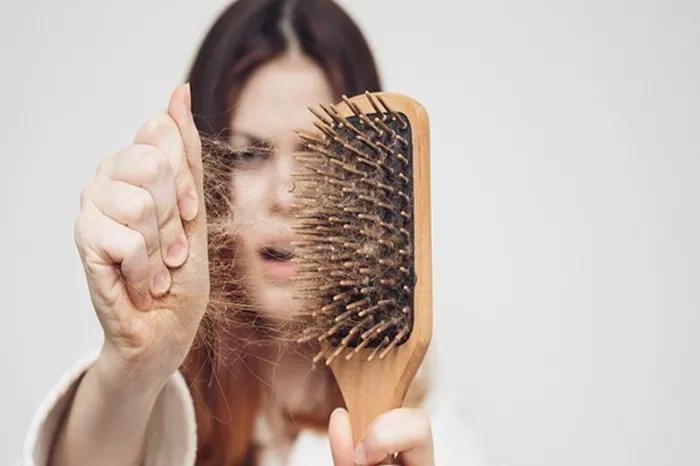Hair fall can be a distressing symptom of thyroid imbalance. Both hyperthyroidism and hypothyroidism can lead to hair loss. Fortunately, there are natural ways to manage and mitigate hair fall related to thyroid conditions. This guide will cover various natural strategies to help stop hair fall due to thyroid issues.
Understanding Thyroid-Related Hair Fall
The thyroid gland produces hormones that regulate metabolism, growth, and development. When the thyroid produces too much or too little hormone, it disrupts these processes, affecting hair growth cycles. Hair loss can occur when hair follicles prematurely enter the resting phase.
Diet and Nutrition
Proper nutrition is essential for thyroid health and hair growth. Here are key nutrients to focus on:
1. Iodine
Iodine is crucial for thyroid function. Include iodine-rich foods like seaweed, fish, dairy products, and iodized salt in your diet.
2. Selenium
Selenium supports thyroid hormone production. Good sources include Brazil nuts, sunflower seeds, mushrooms, and fish.
3. Zinc
Zinc is vital for hair tissue growth and repair. Include foods like spinach, nuts, seeds, and lentils.
4. Vitamin D
Vitamin D deficiency is linked to thyroid disorders. Spend time in the sun, and consume vitamin D-rich foods like fortified cereals, mushrooms, and fatty fish.
5. Iron
Iron deficiency can exacerbate hair loss. Eat iron-rich foods such as red meat, beans, lentils, and spinach.
6. Omega-3 Fatty Acids
Omega-3s promote scalp health. Include fatty fish, flaxseeds, chia seeds, and walnuts in your diet.
Herbal Remedies
Herbs can support thyroid function and reduce hair fall:
1. Ashwagandha
Ashwagandha is an adaptogen that helps balance thyroid hormones. It can be consumed as a supplement or in powder form.
2. Guggul
Guggul is known for its anti-inflammatory properties and thyroid-stimulating effects. It can be taken as a supplement.
3. Nettle
Nettle is rich in iron and other nutrients that support hair health. It can be consumed as a tea or supplement.
4. Rosemary
Rosemary oil can improve circulation to the scalp and promote hair growth. Massage diluted rosemary oil into your scalp.
Lifestyle Changes
Adopting a healthy lifestyle can positively impact thyroid function and hair health:
1. Stress Management
Stress can worsen thyroid conditions and hair fall. Practice relaxation techniques like yoga, meditation, and deep breathing.
2. Regular Exercise
Exercise boosts metabolism and reduces stress. Aim for at least 30 minutes of moderate exercise most days of the week.
3. Adequate Sleep
Sleep is essential for overall health and hormonal balance. Aim for 7-9 hours of quality sleep each night.
Natural Hair Care
Proper hair care can minimize hair fall and promote growth:
1. Gentle Hair Washing
Wash your hair with a mild, sulfate-free shampoo. Avoid hot water as it can strip natural oils.
2. Scalp Massage
Regular scalp massages increase blood flow to hair follicles. Use gentle, circular motions with your fingertips.
3. Avoid Heat Styling
Heat can damage hair and lead to breakage. Limit the use of hair dryers, curling irons, and straighteners.
4. Natural Oils
Oils like coconut, jojoba, and argan oil nourish the scalp and hair. Apply a small amount to your scalp and hair ends.
SEE ALSO: What to Eat to Stop Excessive Hair Fall?
Supplements
Certain supplements can support hair health and thyroid function:
1. Biotin
Biotin strengthens hair and promotes growth. Take biotin supplements as directed.
2. Collagen
Collagen supports hair structure. Consider collagen supplements or bone broth.
3. Multivitamins
A comprehensive multivitamin can ensure you get all essential nutrients for hair and thyroid health.
Avoiding Toxins
Reduce exposure to environmental toxins that can disrupt thyroid function:
1. Avoid BPA
BPA is found in plastics and can interfere with thyroid hormones. Use BPA-free products.
2. Reduce Pesticides
Choose organic produce to minimize pesticide exposure. Wash fruits and vegetables thoroughly.
3. Filter Water
Use a water filter to remove contaminants like chlorine and fluoride that can affect thyroid health.
Regular Monitoring
Keep track of your thyroid levels and hair health:
1. Regular Check-Ups
Visit your healthcare provider regularly to monitor thyroid function and adjust treatments as needed.
2. Track Symptoms
Keep a journal of your symptoms, diet, and hair fall patterns. This can help identify triggers and effective remedies.
Conclusion
Managing thyroid-related hair fall naturally involves a holistic approach. By focusing on a nutrient-rich diet, herbal remedies, lifestyle changes, natural hair care, supplements, and avoiding toxins, you can support thyroid function and reduce hair fall. Regular monitoring and adjustments are key to maintaining optimal thyroid health and hair growth. Remember to consult with a healthcare provider before starting any new supplements or making significant lifestyle changes.
FAQs
Can hair loss from thyroid grow back?
Yes, hair loss from thyroid conditions can often grow back once the thyroid imbalance is corrected. Proper management of thyroid disorders through medication, diet, and lifestyle changes can help restore normal hair growth cycles. However, it may take several months to see significant improvement, and patience is key.
Which oil is best for thyroid hair loss?
Several oils can help manage hair loss due to thyroid issues:
Rosemary Oil: Promotes circulation and stimulates hair growth. Use diluted with a carrier oil and massage into the scalp.
Coconut Oil: Nourishes and strengthens hair. Can be used as a deep conditioning treatment.
Jojoba Oil: Moisturizes the scalp and promotes hair health. Suitable for regular scalp massage.
Argan Oil: Rich in antioxidants and fatty acids. Helps to repair and strengthen hair.
How do you know if hair loss is from thyroid?
Hair loss from thyroid issues often has specific characteristics:
Diffuse Hair Loss: Hair thinning across the entire scalp rather than in patches.
Other Symptoms: Accompanied by other thyroid-related symptoms such as weight changes, fatigue, dry skin, and changes in heart rate.
Blood Tests: Confirm thyroid imbalance through blood tests measuring levels of TSH, T3, and T4 hormones.
Medical History: A history of thyroid disorders can indicate a link between hair loss and thyroid issues.

